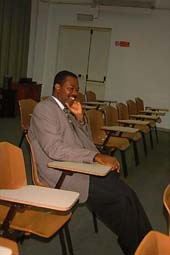Personal tools
News from ICTP 103 - Commentary

ICTP's Aeronomy and Radiopropagation Laboratory has given a face-lift to an old technology, helping to advance the communication revolution in Nigeria.
Radio Ahead
In our fast-paced electronic
world, technologies with an 18-month shelf-life are often considered
aging equipment--just one step from a museum showcase or even
the dustbin.
Yet, sometimes even half-century-old communication technologies
can help power today's communication revolution.
That's exactly what's happened in Nigeria, where radiopropagation
technologies, the same technologies that first brought news and
music to our homes more than 75 years ago, have helped to usher
in the use of email and the internet--all with the assistance
of ICTP's Aeronomy and Radiopropagation Laboratory that launched
the effort with the ICTP Scientific Computing Section.
"Satellite technologies require an infrastructure beyond
the resources of countries like Nigeria and other developing countries,"
explains Sandro Radicella, head of the Laboratory. "And while
cable is more manageable, it is still expensive. Moreover, once
cable fibre is put into the ground, it's not only difficult to
maintain but virtually impossible to replace without severe disruptions
and costs--distinct liabilities when software technologies, system
applications, and individual and institutional demand are changing
so rapidly."
That's where the propagation of radio waves and equipment that
can receive and transmit these waves comes into play. And that's
why ICTP's Aeronomy and Radiopropagation Laboratory has been aggressively
pursuing this strategy for the past several years.
"ICTP research and training activities in this field actually
began in 1989," explains Radicella. "At the time, we
provided research and training solely for such conventional uses
as voice transmission and reception."
Radicella adds that "We began to shift gears--or, should
I say, dials--in the late 1990s when we realised that radiopropagation
technologies held enormous potential to jump-start the use of
email and the internet in the developing world. We thought that
our embrace of radiopropagation technologies could help address
some of the difficult problems of access that were contributing
to the North-South digital divide."
For Radicella and his colleagues, turning to radio waves as a
primary technology for advancing the communications revolution
was like taking an old coat out of your closet and matching it
with a new scarf to give the coat renewed style and flair.
With the help of ICTP Associates Emmanuel Efiong Ekuwem and Gabriel
Olalere Ajayi, the Centre's Aeronomy and Radiopropagation Laboratory
conducted an extensive survey of universities and research institutes
in Nigeria to determine which would be the best candidate to test
their strategy.
The choice for the initial effort was Obafemi Awolowo University
in Ile-Ife, Nigeria, largely because it already had a group of
faculty members who had participated in the Centre's radiopropagation
activities and thus enjoyed the prerequisite training, skills
and contacts to assume local responsibility for this effort.
The impact proved both immediate and dramatic. The pilot project
that began in Obafemi Awolowo University soon spread throughout
Nigeria's teaching and research community. Today, the system reaches
literally thousands of scientists and scholars. More recently,
it has also helped farmers, meteorologists and medical practitioners
link electronically to the broad flow of data and information
now passing through the nation's universities and research institutes.
"Indeed the ultimate importance of this initiative,"
notes Ekuwem, who participated in the Centre's earliest workshops
on radiopropagation for electronic communications, "lies
not just with the ability of university students and faculty to
communicate quickly and efficiently with one another. Rather,
the system's true and lasting value lies with the global connections
that students and faculty now have with like-minded associates
and colleagues via the internet."

Emmanuel Efiong Ekuwem
Ekuwem has tapped this interest by establishing his own radiotechnology
and application business--Teledom International--located in Ile-Ife.
The business has become the largest and most profitable of its
kind in Nigeria.
Ekuwem's personal achievement has enabled him to illustrate another
measure of the programme's success by contributing US$3000 to
the ICTP School on Radio Use for Information and Communication
Technology that took place this February in Trieste. This marks
the first time that a private firm has provided direct financial
assistance to an Aeronomy and Radiopropagation Laboratory activity.
In fact, it is one of the few times that ICTP has received a donation
from a private company in the developing world.
"Ekuwem's contribution," says Radicella, "not only
provides a welcomed boost to our activities' budget but also serves
as a valuable signal that what we are doing has helped improve
the lives of students and researchers throughout Nigeria--both
in intangible and tangible ways."
For additional information about ICTP's Aeronomy and Radiopropagation
Laboratory, please contact rsandro@ictp.trieste.it
or fax +39 040 224604.